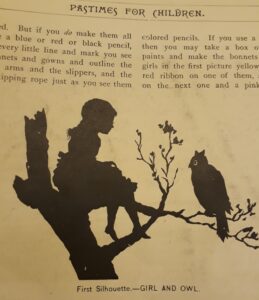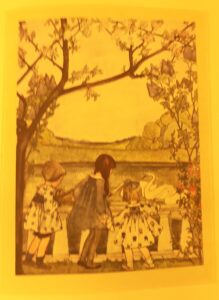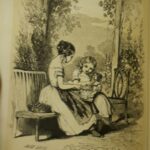In this blogpost, Niamh Keenan presents a personal perspective on what the Museum of Childhood exhibition, Growing Up With Books, means — and how it can be a space for our personal reflection on the books that made us, and a way of connecting us with others.

Unless you have been hiding under a rock, you should be aware that the SELCIE exhibition had its launch on 31st of May. As one of the team, I was allowed to bring a plus one to the evening and I brought a person who was the one really to introduce me to the world of reading. My choice of guest was my mother. How could I not bring the woman who got rid of the television at home and instead insisted on books, with stories on tape being the order of the day during supper time? Being my parent, she was always going to insist how special the exhibition was but it was apparent to me that she was actually intrigued by the nature of the books on display inside the cabinets and how they had been curated. We had a long discussion about that.
While my mother grew up in 1950s Co. Antrim, and I am an Anglo Irish baby from the 1990s, we shared many books that defined us. One such example is Lewis Carroll’s Alice’s Adventures in Wonderland, found in the Other Worlds case; it is extremely close to both of our hearts and yet we appreciate different facets of it. Her funny bone is tickled with the jokes regarding logic and the mathematics that underpin it and I am brought to laughter by the nonsense verses.
This is what makes SELCIE so powerful, namely that it brings into focus how books create a sense of commonality, despite the threads of difference that, inevitably, run amongst us. At the launch, and now as the exhibition runs, visitors mill around and, rather than contain themselves as individual members of the public, anonymous to each other, men and women, families with young children, older couples, exchange reminisces about how this book meant something significant during his or her formative years or about that that volume is akin to one that provoked a visceral reaction when a child.

The quotation attributed to Edmund Wilson that ‘no two persons ever read the same book’ has a lot of truth to it and yet, in some ways, it is a rather superficial comment. It says nothing about how it is through these points of dissimilarity that texts impart to readers the attribute of common understanding.
There may be truth to the statement that we are more divided than ever and yet there is no need for fear in a world where people are open to literature. Books have the ability to bring people together to discuss differences in a completely non-hostile way, exploring who we are and why we are that way inclined. The SELCIE exhibition itself, just as with the volumes in it, provides a chance to look backwards, take stock and project forwards ideas and opinions. One can come to an understanding of another through his or her reading and interpretation and, from there, have discussions on the bases of the findings. Akin to a university tutorial, where various students express what a particular text means to them, the SELCIE exhibition creates a special space, where each person can explore what the text or the components of a case awaken in him or her.

I speak as someone who is fully aware of her bias when I recommend that you, dear reader of the SELCIE blog, visit our exhibition in the Museum of Childhood. Once there, perceive yourself through the texts and then engage with the inner world of another visitor.
This post written by Niamh
For events inspired by the Growing Up With Books exhibition at the Museum of Childhood this summer, please see here for more details! The SELCIE team will also be at the Museum in July and would love to hear your own reflections, reminiscences, and reflections about your childhood reading! More information coming soon! 


